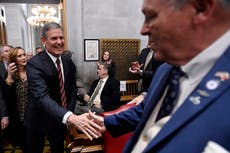Government ‘sorry on behalf of society’ for ‘appalling’ treatment of unmarried mothers
Government says a formal apology was not appropriate ‘since the state did not actively support these practices’ between 1949 and 1976.

A lack of formal government apology to unmarried mothers who faced “appalling treatment” in decades past, including unwanted adoptions, has been labelled “disappointing”.
The Joint Committee on Human Rights (JCHR) had called on the government to issue an apology to women who had their babies taken from them for adoption between 1949 and 1976.
The committee, in a report published in July, argued that the government “bears ultimate responsibility for the pain and suffering caused by public institutions and state employees that railroaded mothers into unwanted adoptions”.
It said an apology by the government “and an official recognition that what happened to these mothers was dreadful and wrong… would go some way to mitigate the pain and suffering of to those affected”.
It gave examples of other formal apologies by the UK government, where statements were made to the House of Commons.
But in its response to the report, the government said while it was sorry for the way the women had been treated, it did not think a formal apology appropriate “since the state did not actively support these practices”.
Whilst we do not think it is appropriate for a formal Government apology to be given, since the state did not actively support these practices, we do wish to say we are sorry of behalf of society to all those affected.
The government response, published on Friday, stated: “The government agrees with the Committee that the treatment of women and their children in adoption practices during this period was wrong and should not have happened.
“Whilst we do not think it is appropriate for a formal government apology to be given, since the state did not actively support these practices, we do wish to say we are sorry of behalf of society to all those affected.”
An estimated 185,000 children were taken from unmarried mothers and adopted between 1949 and 1976 in England and Wales.
Women and girls who became pregnant outside of marriage during these decades were seen as having shamed themselves and their families, the committee said, and babies were taken from mothers who did not want to let them go.
The government said adoption practices during those decades were mainly the responsibility of local authorities, while many mother and baby homes and adoptions were organised by religious organisations including the Catholic Church, the Church of England, and the Salvation Army as well as voluntary organisations.
The UK Government...has said it is sorry for the treatment of unmarried mothers...and it has said sorry on behalf of society for what happened to these women and children
It said it had “deep regret for the adoption practices which caused such suffering” and apologised for the “shame and secrecy” unmarried women had had to face, and said it was sorry for the mistreatment unmarried mothers endured in mother and baby homes and hospitals.
It added: “We are sorry to all those that suffered as a result of these practices. We acknowledge the life-long impact that this has had on so many. We offer the deepest sympathy to all those affected.”
JCHR chairwoman Joanna Cherry said: “It is disappointing that the government has chosen not to issue a formal apology in recognition of the appalling treatment that unmarried mothers suffered during that time, and the lifelong consequences this had on them, on their children, now grown, and all those involved. ”
But she recognised the government’s acknowledgement “that what happened to unmarried mothers and their children was profoundly wrong” and said she was pleased it had taken on board many of the JCHR report’s recommendations such as improving the availability of specialised counselling services, sharing medical information and removing administrative barriers.
Former JCHR chairwoman and current committee member Harriet Harman said she hoped the government’s response will bring “some comfort” for all those affected by the forced adoption practices of those decades.
She said: “The UK government, in its response to our report, has said it is sorry for the treatment of unmarried mothers, it has recognised how wrong these adoption practices were and it has said sorry on behalf of society for what happened to these women and children.
“This acknowledgement has been decades in coming, and for some it tragically comes too late. I hope that there is some comfort for all those affected by the forced adoption practices in the 1950s, 60s and 70s.
“The treatment of these women stands as an important reminder that human rights should be protected for all, including those who at any particular time, are mistakenly regarded as transgressors.”



Bookmark popover
Removed from bookmarks